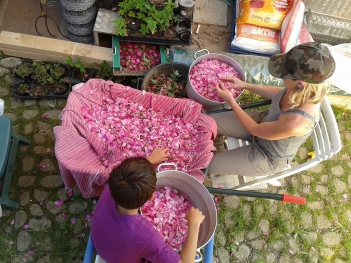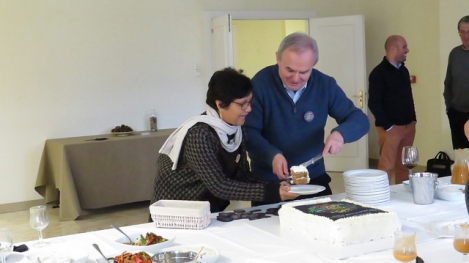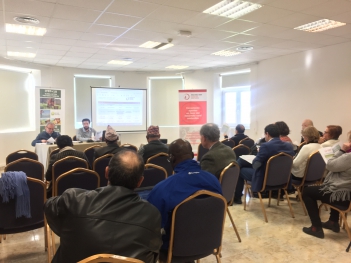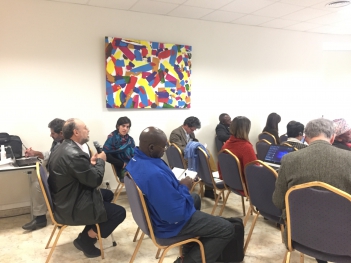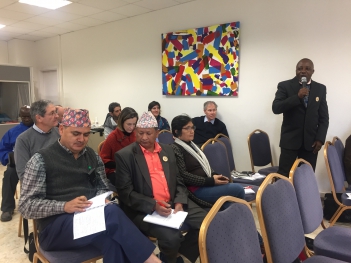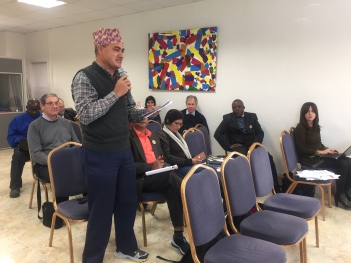The celebration was preceded by the Board of Directors and the General Assembly of the World Rural Forum, and by the international workshop to design a collective action to promote Participatory Research in Family Farming.
Thursday 15 Mars 2018.- On Friday 23 February, the General Assembly of the WRF celebrated the United Nations General Assembly adoption of the Decade of Family Farming 2019-2028 with the presence of several of its members, such as AFA, COPROFAM, SOS FAIM, UDAPA, UAGA and INADES, among others. This celebration was the ideal occasion to share with friends who, since the beginning, have worked towards the Decade being declared and, above all, for the regional Family Farming organisations who, on 23 February 2017, officially and jointly requested the Declaration of the Decade of Family Farming.
According to José María Zeberio, President of the World Rural Forum, “this Decade provides us with a unique opportunity: the International Community has recognised that, given the scale of the challenges we face, including climate change, forced migration, malnutrition, poverty and exclusion, we must have the courage to commit to family farming, implementing policies, programs and support processes in family farming on all continents “.
The General Assembly of the World Rural Forum-WRF, which took place on 23 February 2018 in Derio, was preceded by its Board of Directors, held the previous day. In both meetings, relevant aspects were discussed for the operation of the World Rural Forum. The discussion on renewing the statutes/charter was of special interest, which establishes important improvements in the organisation’s governance system and prepares the WRF to face the next years of work from a stronger position.
Representatives of Abere, Asian Farmers Association-AFA, COPROFAM, Cándido Iturriaga Foundation and INADES International, among others, took an active part in the Board of Directors and the General Assembly. Also, the addition of PROPAC and CSRC organizations as members of the WRF was approved.
PROPAC is the regional platform that brings together agro-silvo-pastoral producer organisations from ten member countries of Central Africa. Its main objective is to coordinate the strategies and actions of the national Family Farming organisations in the region, in designing, implementing and evaluating agricultural development policies so that their proposals can be taken into account in decisions aimed at improving the living conditions of rural populations.
CSRC (Community Self-Reliance Centre), meanwhile, is an entity that has been at the forefront of the campaign for land and family farmers’ rights in Nepal. It is an organisation that has worked closely with the National Land Rights Forum (NLRF), also a Family Farming organisation in Nepal, which currently holds the presidency of AFA (Asian Farmers Association).
A COLLECTIVE ACTION TO GIVE MOMENTUM TO PARTICIPATORY RESEARCH
Prior to the Board of Directors and General Assembly, on 20 and 21 February, the WRF, together with other partner organisations of the GFAR (Global Forum for Agricultura Research and innovation), worked on the blueprint for a Collective Action to allow family farmers to drive agricultural research “Improving participatory processes among farmers and family farmers, civil society/rural communities and research and innovation centres”. It should be noted that this initiative is driven by the WRF together with COPROFAM, current members of the steering committee of the GFAR.
As a result, representatives of family farming organisations such as AFA, COPROFAM, PIFON, CNCR and PROPAC, universities and research centres such as Cirad, ISRA BAME and the University of Louvain, as well as representatives from the European Union, Agricord and the German Ministry of Agriculture, actively participated in this workshop, which was co-organised by the WRF and the GFAR.
The overall aim of the Collective Action is to help transform the current governance model of agricultural research to develop alternative systems of agricultural research and innovation in which governance is inclusive and allows research and innovation processes to be developed with farmers and rural communities themselves playing an active, recognised and valued role.
This initiative will seek, therefore, to strengthen the participation of family farmers in research processes, to ensure that agricultural research takes place “by, with and for” family farmers.
During this workshop, intensive work was carried out to jointly create the Collective Action, which will create a learning space based on the promotion of bottom-up processes, mutual learning, exchange and the removal of institutional barriers.
Participatory research is one of the three areas of work of the IYFF+10/Decade of Family Farming that seeks to encourage and promote the link between the agricultural research sector and Family Farming organisations.
In the coming weeks, we hope that the work which took place on these days will be agreed by the people participating in this Collective Action in a working document detailing the strategy and the concrete actions to be developed in the coming years.
More information:
- Photo gallery https://www.flickr.com/photos/136481115@N08/albums
- GFAR: Collective Action on Family Farming that Values All Partners https://blog.gfar.net/2018/01/31/collective-action-on-family-farming-that-values-all-partners/
- Participatory research: connecting family farming organisations and agricultural research centres http://www.familyfarmingcampaign.org/en/noticias/2017/10/la-investigacion-participativa-conectando-organizaciones-de-la-agricultura-familiar-y-centros-de-investigacion-agraria
- Regional Family Farming organisations request the declaration of the Decade of Family Farming (23 Feb 2017) https://www.ruralforum.org/en/noticias/2017/03/regional-organizations-of-the-agriculture-family-requests-the-declaration-of-decenio-de-la-agricultura-familiar


